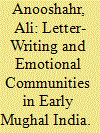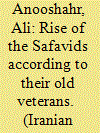| Srl | Item |
| 1 |
ID:
178153


|
|
|
|
|
| Summary/Abstract |
This article investigates the letter-writing manual of the physician Muhammad Yusufi Haravi, composed in the 1530s at the court of the Mughal emperor, Humayun. It argues that by prescribing proper expressions of emotion based on one’s rank, the text reflects a combination of courtly desire and medical expertise which hoped to (but could not) transform the body politic (Mughal elite) into an emotional community. This was because the rapid establishment of Mughal rule in North India quickly scattered elite individuals far from their kinship groups, and the formation of a new social organisation, with the emperor at its apex, was a way to deal with the alienation that resulted from the breakup of kinship bonds.
|
|
|
|
|
|
|
|
|
|
|
|
|
|
|
|
| 2 |
ID:
192968


|
|
|
|
|
| Summary/Abstract |
The Sāmānid dynasty of Transoxiana is perhaps best known today for its foundational contributions to the formation of Persianate culture in the ninth and tenth centuries. The problems of the origins of the dynasty has received scholarly attention for many years. However, the field is in some ways still very much dependent upon nineteenth-century ethno-racial categories. This paper critically traces the history of the question, ending with some alternative approaches based on the shifting of economic power in Transoxania from merchants to the agrarian magnates.
|
|
|
|
|
|
|
|
|
|
|
|
|
|
|
|
| 3 |
ID:
137175


|
|
|
|
|
| Summary/Abstract |
This article studies an early Safavid chronicle, Futuhat-e Shahi by Amini Haravi. In 1521, the founder of the Safavid state, Shah Isma‘il, provided Haravi with a number of veterans from the early days of the Safavid uprising as informants. Their narrative presents an alternative view on the early career of the shah that differs from the dominant version current in modern scholarship. From the perspective of the Futuhat, the rise of the Safavids did not occur as a wild apocalyptic explosion, but was a carefully planned and cautious campaign run by experienced commanders who kept a tight rein on the teenage Shah Isma‘il.
|
|
|
|
|
|
|
|
|
|
|
|
|
|
|
|